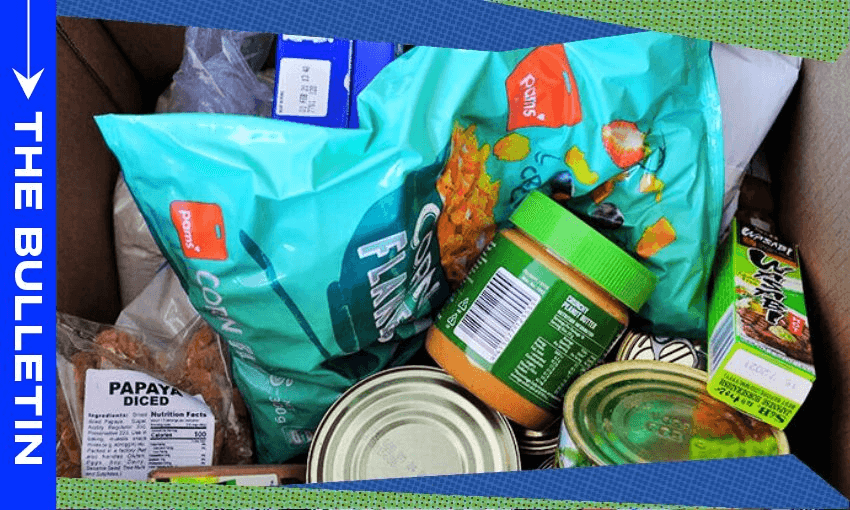Data released in May suggest 485,000 New Zealanders needed food support every month. Foodbanks are reporting record demand and a struggle to keep up, writes Anna Rawhiti-Connell in this excerpt from The Bulletin, The Spinoff’s morning news round-up. To receive The Bulletin in full each weekday, sign up here.
Foodbanks limiting number of parcels
As Christmas bells begin to ring and advertisements for sales blare, Virginia Fallon writes, “If foodbanks are the canary in the coal mine of a nation’s wellbeing, then New Zealand’s bird is starving.” Fallon’s excellent feature for the Sunday Star Times this week finds food banks nationwide reporting huge demand for food parcels. Nelson Community Foodbank has reported a 23% increase in the past financial year. Manager Neville Hadfield says that the service has little option but to limit its support. “We now operate on one parcel per family per month,” he said. In Hāwera, Foodbank chairwoman Hazel Robinson says the demand for food parcels is the highest she’s seen in the 45 years since setting up the service. In Lower Hutt, the foodbank is considering increasing its opening hours.
Export prices push up domestic food prices
A May survey by the New Zealand Food Network (NZFN) found that more than 480,000 people in New Zealand need food support every month. As economist Susan St John tells Fallon, “They’ve become a necessary evil; we shouldn’t have them, and we didn’t used to have them.” The Spinoff’s Charlotte Muru-Lanning reported on similar sentiment from community groups and advocates in the lead up to Christmas in 2021. As Fallon reports, Brooke Pao Stanley, who heads Auckland Action Against Poverty, also says foodbanks aren’t the answer. Stanley says, “It’s ironic that Aotearoa is such a big food provider exporting so much of our kai but so many people here go hungry because they don’t have the money.” Stuff’s Susan Edmunds has recently embarked on a quest to find “something that’s cheaper in New Zealand”. She failed. Food and Grocery Council chief executive Raewyn Bleakley says, “As our exports, particularly dairy products and meat, fetch higher prices, so the pressure goes on what New Zealanders have to pay for them.”
Inflation may be easing but cost of living still high
While food prices fell slightly in October, prices were 6.3% higher than a year earlier. Inflation is easing, but Stats NZ also produces household living-costs price indexes, which capture costs like home loan interest payments not covered in the consumer price index, the way we measure inflation. Auckland City Missioner Helen Robinson said in May that a whole range of people were going to the city mission for support. “People would pay the mortgage or rent, make sure their kids got to school, to the doctor and that there was enough for transport to work”, but “there’s simply not enough so people are coming to us for food.”
‘A perverse and sad money-go-round’
In another excellent feature for the Sunday Star Times, Eugene Bingham dug into the issue of the number of beneficiaries in New Zealand also paying down debt to the government. New guidelines quietly introduced in July are attempting to prevent pushing people further into hardship. As Bingham reports, about 560,000 low-income earners, mostly beneficiaries, owe about $3.5b of combined debt to the Ministry of Social Development, the Ministry of Justice and Inland Revenue. Heather Lange, manager of Family Finance Services Trust in Upper Hutt, says, “We see very few beneficiaries who aren’t paying money back to MSD.” Bingham describes it as “a perverse and sad money-go-round.” “Clients will come in and they can’t afford food and now the car’s broken down or they’re behind in their power or whatever the crisis is and we’ll say, ‘Go to [MSD]’, and we know that what is going to happen is their debt will just grow and grow,” says Lange.
Bingham and his colleague Todd Niall, a dedicated veteran of local government reporting in Auckland, left Stuff last week — Niall has retired, and Bingham says it’s time for some new projects. Their work as journalists has been regularly featured in The Bulletin. Go well, enjoy the grandkids.


